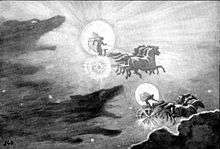Asgard
In Norse cosmology, Asgard (from Old Norse Ásgarðr, 'enclosure of the Æsir) is a location associated with the gods. Asgard is attested in a variety of sources, including the Poetic Edda, compiled in the 13th century from earlier traditional sources, in the Prose Edda (written in the 13th century by Snorri Sturluson), and in euhemerized form in Heimskringla (also written in the 13th century by Snorri Sturluson). The Prose Edda describes Valhalla, the god Odin's afterlife hall for a portion of the battlefield slain, as located in Asgard.[1]
While the Nine Worlds are nowhere detailed in the Old Norse corpus, some scholars have proposed that Asgard may have been considered among them.[2]
Notes
- Simek (2007:20).
- For example, drawing from the eddic corpus, Henry Adams Bellows (1923) proposes that the nine worlds consist of the following: "The world of the gods (Asgarth), of the Wanes (Vanaheim ...), of the elves (Alfheim), of men (Mithgarth), of the giants (Jotunheim), of fire (Muspellsheim ...), of the dark elves (Svartalfheim), of the dead (Niflheim), and presumably of the dwarfs (perhaps Nithavellir ... but the ninth is uncertain)" (Bellows 2004 [1923]:3).
References
This article is issued from
Wikipedia.
The text is licensed under Creative
Commons - Attribution - Sharealike.
Additional terms may apply for the media files.
